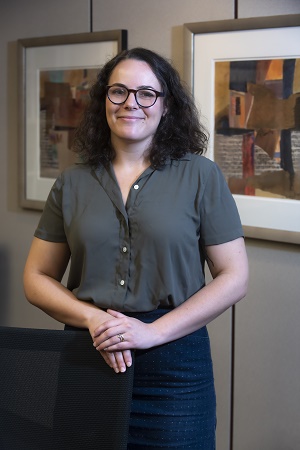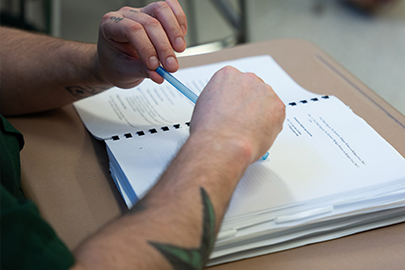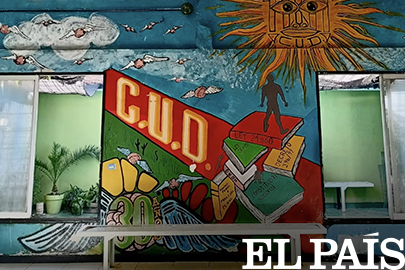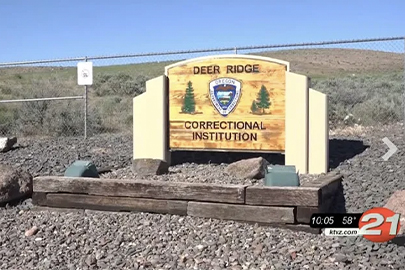The Boston College Prison Education Program (BCPEP) recently launched and joined the Consortium for the Liberal Arts in Prison. With the support of BPI and friends of the University, BCPEP has launched a college-in-prison program within MCI-Shirley. The first cohort was admitted in summer 2019 and began accruing credits toward BA degrees in the fall 2019 semester. This article, reproduced below, first appeared in Diverse Issues in Higher Education.
by Sarah Wood
Inmates at the Massachusetts Correctional Institute (MCI) in Shirley, Massachusetts can now apply to take Boston College (BC) accredited liberal-arts courses.
The program, Boston College’s Prison Education Program (BCPEP), launched in September as part of a nationwide group of correctional education programs under the Bard Prison Initiative (BPI). Since its establishment in 1999 at Bard College, BPI has issued over 50,000 credits and 550 degrees.
“It was founded really in a recognition of the confluence of two essential social crises in the United States,” said Max Kenner, executive director at BPI. “The first being what we now call mass incarceration and the other, being the way we provide higher education in a democratic and accessible way to diverse communities within the United States.”

Isabel Lane
The program’s courses are taught by BC instructors and based on similar curriculum to those used in traditional undergraduate classes. This semester, available courses include introductory philosophy, algebra and writing, part of BC’s core curriculum.
“They aim to hold those incarcerated students to the same standards and have the same levels of ambition and aspirations for those student’s futures as they do with students on campus,” said Kenner.
To be eligible for the program, potential students are required to hold a high school degree. Applicants are given a written exam and selected individuals undergo an interview portion. For BC’s first cohort, 16 men were selected out of nearly 100 applicants.
Though only a few months into the semester, BCPEP program director Isabel Lane said a community has been built within the classroom.
“The students are extremely invested in it,” she said. “They want it to succeed, they are just so happy to be in school. And it’s been challenging for them too because these are college level classes. Many of them have had college experience before but many of them have not.”
Kenner said that prison education programs reduce recidivism and violence as well as increase the likelihood of employment and healthy family relations.
Research by the Rand Corporation found that inmates who participate in correctional education programs were 43 percent less likely to reoffend. The rate of obtaining employment post-release among inmates who participated in correctional education was 13 percent higher compared to those that did not.
Additionally, prison education programs are more cost effective.
Recidivism can cost between $2.94 million and $3.25 million for those inmates who did not enroll in prison educational programs. On the other hand, inmates who engaged in correctional education programs cost prisons, on average, between $2.07 million and $2.28 million, according to Rand.
“This BC commitment to formation and actually creating opportunities for students to think, to learn, to discover themselves, to figure out the kinds of people they want to be in the world, whether that is within a correctional facility or if they are released out on the streets,” said Lane. “I think it just gives people an opportunity to learn how to think in a different way.”
Patrick Conway, a doctoral student at BC who is a writing instructor for BCPEP described the students as “extremely motivated.”
“You can see the chance to develop the critical thinking, intellectual flexibility, inner-thought, dialogue with each other but also with texts, which I just don’t think prisoners often have the opportunity to do especially in a classroom environment where their ideas are actually being valued as opposed to sort of having commands being dictated to them. I think there’s real value there,” said Conway.
Students can enroll in the courses tuition and cost free as textbooks and other materials are provided.
An anonymous donor gave BC the seed money to establish the program. In the future, the institution will look for other sources of funding besides private donations, according to Lane. However, public funding for prison education programs has declined in recent years.
Overall, spending on prison education nationally fell on average by six percent from 2009 to 2012, according to Rand.
“What’s not a challenge is the teaching,” said Kenner. “This is a tragedy, but American prisons are filled with people who make up some of the college undergraduates we have in the United States who feel a desire and motivation to learn; who feel an inspiration that the future can be better and recognize the kinds of ideas that are cultivated in the liberal arts classroom are relevant to each of them.”
Next spring, BC plans to introduce theology, history and literature courses to the schedule. The second cohort of students will be admitted next fall. Down the line, there are plans for the program to provide fully accredited BC bachelor’s degrees.
Lane said awareness and exposure is important as many may not think about what occurs in a correctional facility.
“I hear a lot of people discussing whether or not their undergraduate degrees were formative or what effect it had on them as people,” she added. “So, I think it’s fantastic to think about that opportunity, if you are someone who went to college, whether that was a good experience or not, to think about what it would mean for incarcerated men and women to have that opportunity too.”
Sarah Wood can be reached at [email protected].




